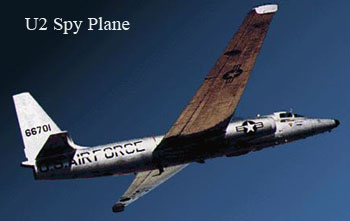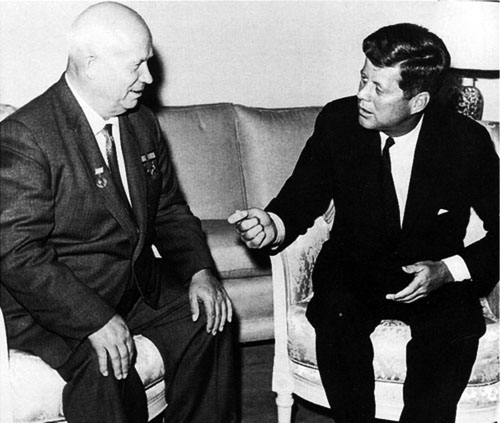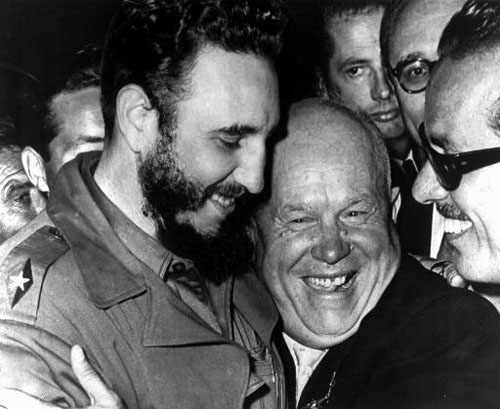A History Lesson
Today, we take a lesson from history. The University of Houston's Honors College presents this program about the machines that make our civilization run, and the people whose ingenuity created them.
"Those who cannot remember the past are condemned to repeat it," said George Santayana. Few lines are as striking, yet few lines are as dubious. When you think about history, you might wonder if "Those who cannot forgetthe past are condemned to repeat it." Or "Those who remember the past simply make new mistakes." The variations are many and they're equally compelling. But when we recall the hair-raising story of thirteen days in 1962, Santayana did get it right.
 On October 16 of that year President John Kennedy convened the National Security Council. He had shattering news: a U-2 flight over Cuba discovered Soviet nuclear missile sites under construction. What to do? Kennedy's military advisors thought the answer was obvious: order an immediate air strike against the facilities. Kennedy, however, ended the meeting by ordering a naval blockade of the island. The president's caution was not welcomed: one general told his colleagues: "Do the S.O,B. and do it right ... You got to go in and take the damn thing out."
On October 16 of that year President John Kennedy convened the National Security Council. He had shattering news: a U-2 flight over Cuba discovered Soviet nuclear missile sites under construction. What to do? Kennedy's military advisors thought the answer was obvious: order an immediate air strike against the facilities. Kennedy, however, ended the meeting by ordering a naval blockade of the island. The president's caution was not welcomed: one general told his colleagues: "Do the S.O,B. and do it right ... You got to go in and take the damn thing out."
Tempers on the other side were equally frayed. Nikita Khrushchev ordered Soviet ships to maintain course for Cuba: American interference, he warned, meant war. Masking his own anxiety, he then went to the Bolshoi Ballet that night to reassure the public that all was well. But all wasn't well. As Soviet ships approached Cuba, the American Strategic Air Command was placed on war footing and the world waited in fear and trembling. On October 27, the Cubans shot down a U-2. That same day, Bobby Kennedy curtly told the Soviet ambassador: remove the missiles or the US would remove them. The next day, Krushchev announced that the missile sites would be dismantled.
At the last minute, the world did not tip into nuclear holocaust. Why? Any answer would have to include Kennedy's reading of history. Earlier that year, Barbara Tuchman's The Guns of August was published. A bestseller, the book brilliantly recounts the events leading up to WW-I: events marked by "stupidity, individual idiosyncrasies, misunderstandings, and personal complexes of inferiority and grandeur" of the major actors. Those words are, in fact, John Kennedy's. For he had read Tuchman's book. In the midst of the crisis, he told his brother: "I am not going to follow a course which will allow anyone to write a comparable book about this time, [and call it] The Missiles of October."
Kennedy made good his promise: unlike the statesmen of 1914, he refused to be cowed by military advisors, rushed by events, shackled by timetables. Kennedy knew it was essential to talk with one's enemies and keep, at all costs, from pushing them "an inch beyond what was necessary."
Forty-eight years earlier, the German chancellor Bettman-Hollweg was asked how WW-I happened. According to Tuchman, he'd replied: "Oh, if only I knew." By rightly remembering the past, Kennedy knew what Bettman-Hollweg didn't know. And, at least this one time, history was not repeated.
I'm Rob Zaretsky, at the University of Houston, where we're interested in the way inventive minds work.
J. Glover: Humanity: A Moral History of the Twentieth Century. (New Haven: Yale University Press, 1999).
The general's complaint after Kennedy left the room was stronger than we felt we should quote verbatim on air. It was, "Do the son of a bitch and do it right, and quit friggin' around ... You got to go in and take out the goddam thing."
B. Tuchman, The Guns of August. (see, e.g., Presidio Press, 2004). Below, the main players: Above, Khruschev and Kennedy; Below, Castro and Khrushchev. (These images are courtesy of Wikipedia. The U2 image is courtesy of the Strategic Air Command)

